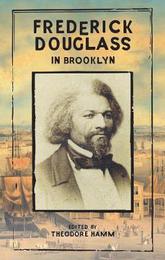
|
Frederick Douglass In Brooklyn
Paperback / softback
Main Details
| Title |
Frederick Douglass In Brooklyn
|
| Authors and Contributors |
Edited by Theodore Hamm
|
| Physical Properties |
| Format:Paperback / softback | | Pages:218 | | Dimensions(mm): Height 178,Width 127 |
|
| Category/Genre | Slavery and abolition of slavery |
|---|
| ISBN/Barcode |
9781617754852
|
| Classifications | Dewey:326.8092 |
|---|
| Audience | |
|---|
|
Publishing Details |
| Publisher |
Akashic Books,U.S.
|
| Imprint |
Akashic Books,U.S.
|
| Publication Date |
16 February 2017 |
| Publication Country |
United States
|
Description
This volume compiles original source material that illustrates the relationship between the abolitionist, Frederick Douglass, and Brooklyn. The volume provides a healthy sampling of clippings from newspapers, including the New York Tribune, Brooklyn Daily Eagle, and the Brooklyn Daily Times, which published Walt Whitman's account of Douglass's 1859 speech in Williamsburg. An introductory essay examines the intricate ties between Douglass and Brooklyn abolitionists, while brief chapter introductions and annotations fill in the historical blanks.
Author Biography
Theodore Hamm is chair of journalism and new media studies at St. Joseph's College in Clinton Hill, Brooklyn. His previous books include Rebel and a Cause, The New Blue Media, and Pieces of a Decade (coedited with Williams Cole). Hamm's writings about New York City history and politics have appeared recently in the Village Voice, Vice News, the New York Daily News, and Jacobin. He lives in Sunset Park, Brooklyn.
ReviewsThis collection of Douglass's speeches in Brooklyn displays the power of the former slave's oratory before, during, and after the Civil War. Editor Hamm, a professor of media studies, places a selection of carefully reconstructed speeches in this slim volume, and gives useful context on how they were locally received. A concise introduction provides detail about 19th-century Brooklyn and its conflicted legacy of racial prejudice and abolitionism. When Douglass's own words are reproduced, his talent as a writer and the sheer monstrousness of slavery are both driven home. --Publishers Weekly A fascinating collection of Frederick Douglass's controversial speeches in Brooklyn, N.Y., this volume compiles original source material that illustrates the relationship between the abolitionist and the then city of Brooklyn. --Publishers Weekly, Fall 2016 Announcements The beauty of the book is how fresh [Douglass's] words are, how contemporary his voice sounds, and how resonant the message is. More than a century after his death, Douglass's message speaks to us, as clear and crisp as the day he gave voice to the fight for human rights in the United States. --Crave Douglass is always timely, but ever more so today, this week, this year. --Brooklyn Magazine Abolitionist, racial justice leader, orator and former slave Frederick Douglass' speaking engagements took him all over the northern United States and the United Kingdom. But it's the lectures he delivered in Brooklyn between 1859 and 1893 that feature in a new collection edited by historian and writer Theodore Hamm. --Colorlines A fresh and incisive compilation . . . Hamm's thoughtful introductions to each contextualize Douglass's soaring oratory . . . Douglass presciently touched upon social issues of division and assimilation still relevant in the 21st century. --Shelf Awareness for Readers A collection of eight speeches by the abolitionist leader of the 1800s still provides interesting reading more than a century later. --World Wide Work It is my hope that this book will introduce Frederick Douglass to a generation that could benefit from the example of his clarity of purpose and moral vision, as well as his relationship to the borough of Brooklyn. --Brooklyn Borough President Eric L. Adams Theodore Hamm simultaneously engages scholars of history, politics, and New York City in his well-edited and carefully crafted selection of Frederick Douglass's speeches in Brooklyn. Many of the questions raised by Douglass are still relevant today. What will be the fate of black people living in the US? Do places like Brooklyn serve as incubators of injustice--or promise a better future--for people of color? This is an insightful and invaluable book for anyone interested in race, ethnicity, cities, injustice, and the quest for equality. --Christina Greer, associate professor of political science at Fordham University and columnist, The Amsterdam News
|